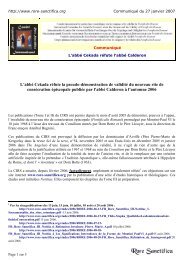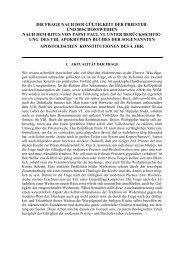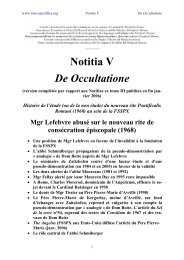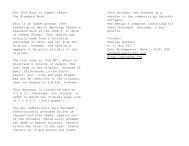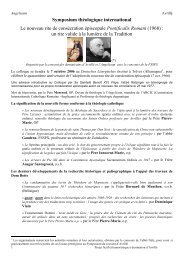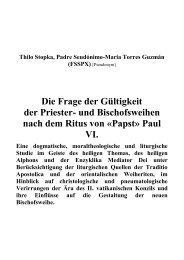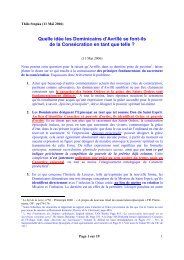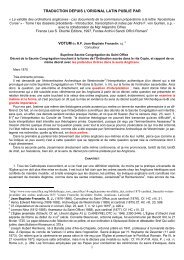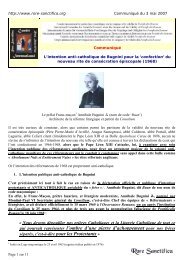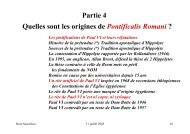THE ORDER OF MELCHISEDECH A Defence of ... - Rore Sanctifica
THE ORDER OF MELCHISEDECH A Defence of ... - Rore Sanctifica
THE ORDER OF MELCHISEDECH A Defence of ... - Rore Sanctifica
Create successful ePaper yourself
Turn your PDF publications into a flip-book with our unique Google optimized e-Paper software.
care, leadership <strong>of</strong> worship and so on-----what difference does it make for a person to be ordained?<br />
We tried to answer that by . . . "In ordination a person is given authority to act on behalf <strong>of</strong> the<br />
whole Church". 11<br />
An important study entitled Lay Presidency at the Eucharist? was published in 1977. It is a booklet<br />
which every Catholic could study with pr<strong>of</strong>it as it expresses the viewpoint <strong>of</strong> a body <strong>of</strong> Anglican<br />
opinion which is growing in strength.<br />
The Reverend Trevor Lloyd contributed an introduction favouring the appointment <strong>of</strong> "laypresidents"<br />
for the Eucharist in which he makes the following points:<br />
In what does presidency consist? If you have a doctrine <strong>of</strong> consecration which implies a "moment"<br />
<strong>of</strong> consecration, whether by words or by manual acts, then you need someone to do and to say those<br />
things with sufficient authority, given him by the Church to do so. If, however (and many would<br />
say we had now moved into this position) there is no "moment" <strong>of</strong> consecration and it is the whole<br />
action that gives significance to the bread and wine, it could be argued that there is no longer any<br />
definitely "presidential" act. If there is, what is it? It surely cannot be the "compering" function<br />
many presidents at parish Eucharists seem to have. And it is difficult to see it simply as the recital<br />
<strong>of</strong> one prayer . . . it would seem far less damaging to license a number <strong>of</strong> leading lay people as<br />
Eucharistic presidents, recognising the extreme diversity <strong>of</strong> gifts and ministries in the Church <strong>of</strong><br />
England (as in the Church in the New Testament), than to insist on "ordination" for such people. 12<br />
There is also ample testimony available to prove that contemporary Lutherans have not departed<br />
from any <strong>of</strong> their founder's fundamental axioms. In 1958 the United Evangelical Church <strong>of</strong><br />
Germany published an <strong>of</strong>ficially approved report entitled A Declaration concerning the Apostolic<br />
Succession. 13 Among the points made in the report is that apostolic succession in the Catholic<br />
sense can be accepted as a sign <strong>of</strong> "the real apostolic succession" if understood as "appropriate but<br />
not objectively necessary". It will not accept this system <strong>of</strong> episcopal succession as the exclusive<br />
means for transmitting the full authority <strong>of</strong> <strong>of</strong>fice.<br />
. . . the mission to a pastoral <strong>of</strong>fice cannot be established in a uniform way <strong>of</strong> transmission and<br />
succession from person to person, a real mission and authorization thereto can be effected by the<br />
Holy Spirit through extraordinary means. Restriction <strong>of</strong> the transmission <strong>of</strong> authority to <strong>of</strong>fice<br />
holders in the line <strong>of</strong> historical succession is contradictory to the sovereign freedom <strong>of</strong> the Holy<br />
Spirit in the Church and the frailty <strong>of</strong> the earthly existence <strong>of</strong> the Church. Moreover, it accentuates a<br />
separation <strong>of</strong> clergy and laity that is not in keeping with the reciprocity <strong>of</strong> the services between the<br />
spiritual authority <strong>of</strong> the special <strong>of</strong>fice and that given to all believers.<br />
The declaration states specifically that:<br />
Indeed, the maintenance <strong>of</strong> the Church in the succession <strong>of</strong> the apostolic faith can also be preserved<br />
by special acts <strong>of</strong> God, who in exceptional circumstances awakens true shepherds outside the<br />
institutional succession <strong>of</strong> <strong>of</strong>fices in the Church. They carry on the pure apostolic preaching.<br />
Because episcopal succession in the Catholic sense is not accepted as the exclusive means <strong>of</strong><br />
transmitting the apostolic succession, denominations which do not practise it would not be required<br />
to adopt it in the event <strong>of</strong> reunion.<br />
We do not regard as necessary . . . the further extension <strong>of</strong> such an episcopal succession to churches<br />
which do not already have it. Indeed such a policy could even be dangerous because it might give<br />
rise to the misunderstanding that ordination in churches without episcopal succession is not fully<br />
valid.<br />
All this is commendably frank and is particularly relevant to the Agreed Statement, Ministry and



